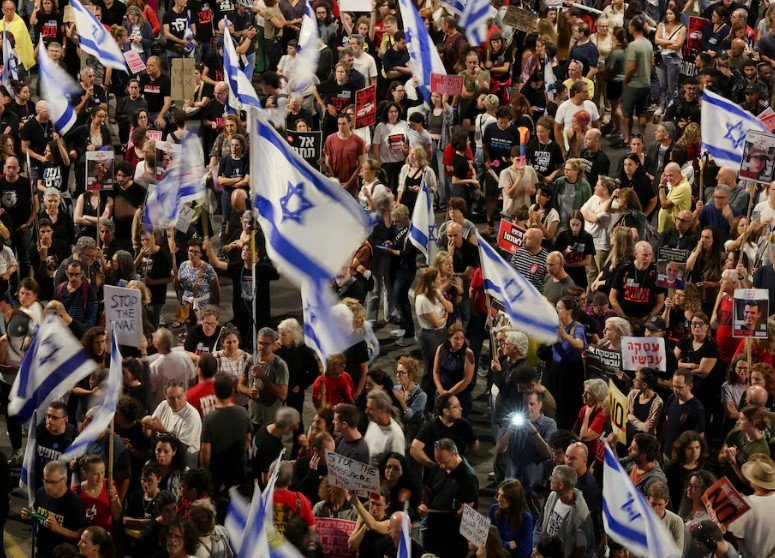Marchers urge Netanyahu to halt IDF expansion, fearing for hostages’ lives amid rising public anger
A wave of raw emotion swept through Tel Aviv on Wednesday night as families of hostages held in Gaza joined hundreds of protesters to demand Israel pause its plans to fully occupy the Strip. With the Kirya military headquarters in the backdrop, demonstrators warned that military escalation could seal the fate of those still in captivity.
Some held candles. Others clutched photos of their loved ones. But all of them had one message: don’t risk more lives in the name of war.
A protest with personal stakes
It wasn’t just another night of chanting in Tel Aviv. This one felt different.
The streets were packed with urgency as parents, siblings, and children of hostages stood shoulder to shoulder with activists and concerned citizens. The atmosphere pulsed with tension, hope, and heartbreak.
Michel Illouz, father of hostage Guy Illouz, was forcibly removed by police during a confrontation that underscored how high emotions have run. His removal sparked boos from the crowd and brief scuffles with officers.
“This war already took too much,” shouted one woman holding a sign that read, “Bring them home, not more tanks.”
Just hours earlier, the Israeli government reaffirmed its commitment to intensify operations in southern Gaza—a move that drew both internal support and deep criticism.

Former hostages speak out
In a rare public appearance, Yocheved Lifshitz and Ohad Ben-Ami, both released in earlier hostage deals, stood before the crowd and lent their voices to the growing call for negotiation.
“We know what it’s like inside,” said Lifshitz, whose calm demeanor barely masked her anguish. “These are human beings. We can’t treat them like collateral damage.”
Ben-Ami added bluntly, “If this occupation continues, it may be the last nail in their coffins.”
-
The two former hostages called on Prime Minister Benjamin Netanyahu to:
-
Suspend further expansion into Rafah and Khan Younis.
-
Reopen negotiations through Egyptian and Qatari intermediaries.
-
Accept a partial deal if it meant saving some lives now.
-
There were no government representatives at the protest.
Where is the government on this?
Public opinion in Israel is splintered. While polls suggest a majority still supports dismantling Hamas’s capabilities, there’s growing discomfort over the mounting death toll and the unresolved fate of more than 120 hostages.
The Prime Minister’s Office has made no comment about the Tel Aviv protest, but IDF sources speaking anonymously to Channel 12 said the military is operating with “strategic urgency.”
Here’s what we know about the hostage situation as of August 7, 2025:
| Status | Number |
|---|---|
| Hostages held in Gaza | ~124 |
| Confirmed alive | 42 |
| Confirmed deceased | 32 |
| Unverified/unknown status | 50 |
Those numbers are based on a joint update by the IDF and Shin Bet earlier this week.
Meanwhile, a quiet rift is growing inside the security cabinet. Defense Minister Yoav Gallant reportedly warned in a closed-door meeting that “any large-scale ground sweep could trigger executions,” a comment leaked to Haaretz.
The Kirya flashpoint
The protest passed through Kaplan Street before arriving at the Kirya military complex—Israel’s Pentagon—where tensions reached a fever pitch.
Dozens of police in riot gear formed barricades as chants of “Enough blood for politics!” echoed. Some sat on the road, refusing to move. Others scrawled names of hostages in chalk along the sidewalk.
At one point, officers tried to break up a sit-in, pulling people away one by one. No major injuries were reported, but the mood grew darker.
One mother shouted, “My son is in a tunnel and you’re protecting office buildings!”
She wasn’t alone.
Growing global spotlight
The protest didn’t go unnoticed abroad.
Social media videos from the scene quickly racked up millions of views. Messages of solidarity came from hostage advocacy groups in Europe and the U.S. The White House said it’s “deeply concerned” about the impact a full-scale occupation might have on ongoing efforts to secure hostage releases.
The UN’s Special Coordinator for the Middle East Peace Process, Tor Wennesland, tweeted late Wednesday: “Families of the missing deserve clarity, compassion, and diplomacy—not more chaos.”
One small paragraph, but it hit hard.
The clock keeps ticking
Every day that passes without progress weighs heavily on families. The Kirya protest may not have changed policy overnight, but it forced a conversation back onto the national stage.
Many demonstrators vowed to return next week. Others called for more disruptive actions. But most, like the elderly couple sitting on a bench in silent protest, simply hoped someone in power was listening.
There were no fireworks. No speeches from big politicians. Just heartbreak, resistance, and a fragile sliver of hope.
